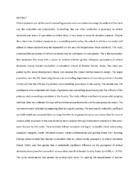| dc.description.abstract | Ethical standards are at the core of counselling practice and are aimed at ensuring the welfare of the client and
the counsellor are safeguarded. Counselling, like any other profession is governed by ethical standards and
unless it’s provided on ethical basis, it may cease to serve its intended purpose. Despite the critical role of ethical
standards in a counselling relationship, the extent to which a counsellor will adhere to these standards may be
dependent on the way he/she perceives these standards. This study presumed that perception of ethical standards
may be contingent on ones gender. This is the assumption that motivated this study with a desire to validate
whether gender influences perceptions of ethical standards among teacher counsellors in secondary schools in
Kiambu County, Kenya. The study was guided by the moral development theory and adopted the mixed method
research design. The target population was the 281 heads of guidance and counselling departments of secondary
schools in Kiambu County and the five officials of guidance and counselling association in the county. The
sample was 170 participants who comprised 165 heads of guidance and counselling departments and five
officials of the guidance and counselling association in the County. The study utilized stratified and purposeful
sampling methods. Data was collected through self-administered questionnaires and focused group discussion.
The instruments were validated by subjecting them to expert’s scrutiny. The instrument’s reliability coefficient
was 0.80 which was accepted. Data accruing from the focus group discussion was transcribed for ease of
analysis while responses to the questionnaire were analysed through independent sample test. Five areas were
focused by the study. These included ethical standards relating to counsellor-client relationship, counsellor
integrity, clients informed consent, clients confidentiality and putting clients first. Accruing findings
demonstrated that teacher counsellor’s had an unfavourable perception of ethical standards (mean =2.84). and
that gender had a statistically significant influence on the perception of ethical standards among teacher
counsellor’s in secondary schools in Kiambu County, Kenya (p= 0.000, t= -2.276). The study recommends that
gender be an important factor for guiding the appointment of teacher counsellor’s and capacity building targeting
male counsellors be initiated. Additionally, the study recommends that further research be carried out to establish
whether there will be gender differences in perception of ethical standards and psychological gender. The study
contributes to the body of knowledge as it provides a model of predicting the perception of ethical standards
given the gender of teacher counsellors. | en_US |
